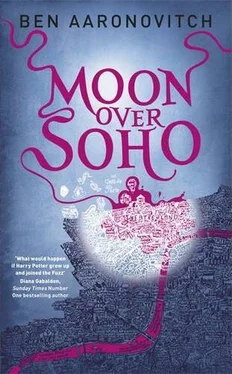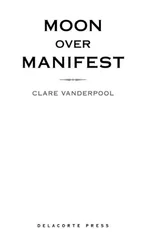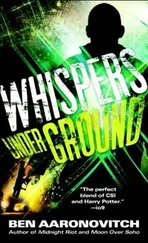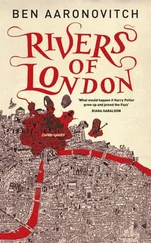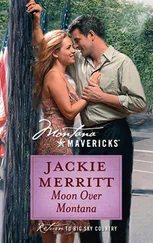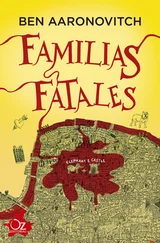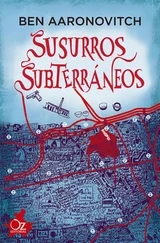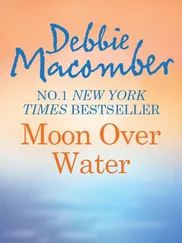“Was he the eldest son?” I asked.
“Only son,” said Martha bitterly. “I’ve got two other sisters. They don’t live here anymore.”
I nodded to show I understood. Favored son, the girls work but the boy carries the name. “How long had he been playing jazz?”
“Mickey? Since forever,” said Martha.
“Did you think he was good?”
“He was brilliant,” she said.
I asked if her parents minded that he was going to be a musician but she said that Mickey had it covered. “He had a place at Queen Mary’s reading law,” she said. “He figured that would give him at least four years to become famous.”
And once he was famous Mother and Father wouldn’t care — as long as he was rich as well. Martha obviously thought it was a workable plan. I asked about his love life and apparently that wasn’t a problem either — at least not as much of a problem as it might have been.
“White girl?” I asked.
“Yeah,” she said. “But Cherie was really nice and a bit posh so, you know, that softened the blow for Mum and Dad.”
Martha didn’t know the girlfriend’s details but she promised to ask her parents when they got back. She couldn’t think of anybody who had it in for Mickey, or anything suspicious at all. “He just went out one afternoon,” she said. “And came back dead.”
ON MY way back from Cheam I got a call from Ms. Ghosh at the Musicians Union. She wanted to tell me about the new wave of Anglo-Indian jazz that was coming out of Mumbai these days. I let her go on — it was better than the radio.
“Anyway,” she said eventually. “There was one case. A member called Henry Bellrush, died suddenly just after a gig. The reason I remember is because I’d met him a couple of times and he always seemed so fit and healthy. London Marathon and all that … sort of thing.”
She gave me the address. It was in Wimbledon and since I was still south of the river I headed over. Plus, I was pretty certain that sooner or later the whole hijacking-and-ambulance thing was going to land on my head. I wasn’t in a hurry to rush back for that.
“I’M NOT sure,” said Mrs. Bellrush as she offered me a cup of tea, “that I quite understand what you’re doing here.”
I took the cup and saucer, the visitor china, I noticed, and cradled it in my lap. I didn’t dare put it down on the immaculate mahogany coffee table, and resting it precariously on the arm of the sofa was out of the question.
“We periodically review nonhospital fatalities,” I said.
“Whatever for?” asked Mrs. Bellrush and seated herself opposite me, neatly tucking her legs to the left. Anita Bellrush, widow of Henry “the Lips” Bellrush, was in her mid-fifties, dressed in mauve slacks and a carefully ironed white silk blouse. She had sandy blond hair and narrow blue eyes. She lived in the kind of 1930s brick-built detached house with bay windows that you can find in the suburbs all over Britain, but in this case it was located in Wimbledon. It contained a lot of good solid oak furniture overlaid with a layer of doilies, flowery chair covers, and Dresden porcelain. It was chintz but not the cat-lady chintz I was used to. Perhaps it was Mrs. Bellrush’s manner or steely blue eyes but I got the distinct impression that this was aggressive chintz, warrior chintz, the kind of chintz that had gone out to conquer an Empire and still had the good taste to dress for dinner. Any IKEA flat-pack that showed its face around here was going to be kindling.
“Because of Harold Shipman,” I said. “You remember him?”
“The doctor who killed his patients,” she said. “Ah, I see. You do random checks of routine deaths in order to ensure that the reporting is accurate. Presumably you also apply pattern recognition systems to see if you can spot any anomalous trends.”
It sounded like a great idea but I suspected we didn’t because one of the first rules of police work is that trouble will always come looking for you, so there’s no point looking for it.
“I just do the legwork,” I said.
“Somebody always has to do the legwork,” she said. “Biscuit?”
They were the expensive ones with the dark chocolate covering with the greater-than-five-percent cocoa solids.
Henry Bellrush had learned to play the cornet in the army. He’d enlisted in the Royal Corps of Engineers and had risen through the ranks to major before taking early retirement at the turn of the century.
“We met in the army,” said Mrs. Bellrush. “He was a dashing captain and so was I, it was very romantic. In those days once you were married you were out, so I moved into civvie street.” And ironically found herself in the same line of work as she had been in the army. “Only much better paid of course,” she said.
I asked what kind of work but Mrs. Bellrush said she couldn’t tell me. “All very hush-hush I’m afraid,” she said. “Official Secrets Act and all that jazz.” She looked at me over the rim of her teacup. “Now, what is it you want to know about my husband’s death?”
If ever a man had enjoyed his retirement it had been Henry Bellrush, what with the garden, the grandchildren, the holidays abroad, and, of course, his music. He and some friends used to play at the local pub — strictly for their own enjoyment.
“But he joined the Musicians Union,” I said.
“That was Henry,” said Mrs. Bellrush. “He came up from the ranks — never lost that sense of solidarity with the common man.”
“You didn’t notice anything unusual in his behavior?” It was a standard question.
“Such as what?” she asked, just a tad too defensively.
“Staying out late, unexplained absences, forgetfulness,” I said, all of which got nothing. “Changes in spending habits, unusual receipts, credit card bills.” That got a reaction.
Her eyes met mine and then she looked away.
“He’d been making regular purchases from a shop in Soho,” she said. “He didn’t try to hide it from me and it was all there on his credit card statement. After he died I found some receipts still in his wallet.”
I asked where they were from.
“A Glimpse of Stocking,” she said.
“The lingerie shop?”
“You know it?”
“I’ve walked past it,” I said. Actually I’d once spent about ten minutes looking in the window, but to be fair I was on patrol, at three in the morning, and I was very bored. “Are you sure he wasn’t buying a present for you?”
“I’m sure I never received anything quite as daring as a scarlet Alloetta corset in raw silk with matching satin knickers,” she said. “Not that I would have been averse. Shocked, perhaps, but not averse.”
People don’t like to speak ill of the dead even when they’re monsters, let alone when they’re loved ones. People like to forget any bad things that someone did and why should they remember? It’s not like they’re going to do it again. So I kept the next question as emotionally neutral as I could.
“Do you think he might have been having an affair?”
She stood, walked over to an antique folding desk, and retrieved an envelope.
“Given the nature of the purchases,” she said, handing me the envelope, “I can’t think of an alternative explanation — can you?”
Inside the envelope was a sheaf of receipts, most of them of the kind printed out by a modern till, but a couple handwritten in what I suspected was a deliberately archaic fashion — these had A GLIMPSE OF STOCKING printed at the top.
He might have been a transvestite, I thought, but I kept that to myself.
GIACOMO CASANOVA, the original Italian stallion, arrived in London to find one of his ex-lovers and babymothers holed up in Carlisle House, the former residence of the Earl of Salisbury, which faced onto Soho Square. Her name was Teresa Cornelys and, for her services to dissipation, debauchery, and the home furnishing industry she was once declared the Empress of Pleasure.
Читать дальше
